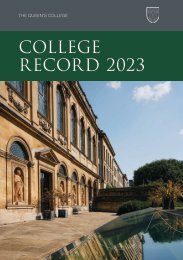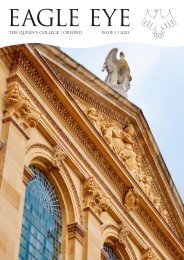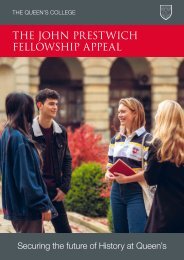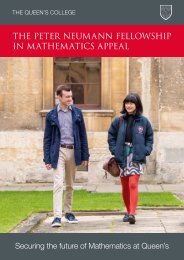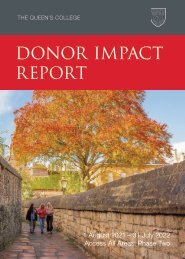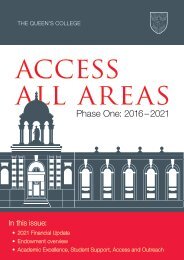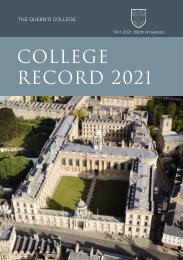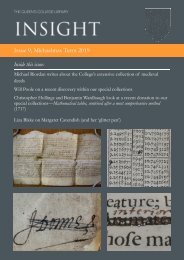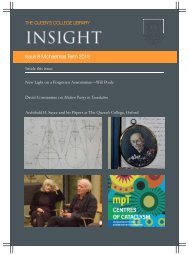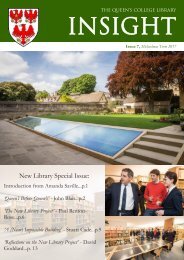The College Record 2022
Create successful ePaper yourself
Turn your PDF publications into a flip-book with our unique Google optimized e-Paper software.
Reports and <strong>College</strong> Activities<br />
Credit: John Cairns<br />
students who for a wide variety of reasons are having difficulties with their studies.<br />
It has to be said that there have been quite a few more of those this year than<br />
last, showing perhaps that the effects of COVID-19 are delayed and unpredictable.<br />
This job, which has taught me a lot about how the <strong>College</strong> and the University work,<br />
would not be possible without the Academic Administrator, Sarah McHugh, who<br />
fortunately for me and many students is punctilious, full of knowledge, and witty.<br />
We’re lucky to have her.<br />
Christopher Metcalf (Literae Humaniores)<br />
A ‘sabbatical year’, according to the Oxford English<br />
Dictionary, is in its original sense ‘the seventh year,<br />
prescribed by the Mosaic law to be observed as a<br />
“Sabbath” in which the land was to remain untilled’. I am<br />
now fortunate to look forward to an intermission of this<br />
kind, and to reflect on the past six years of service at the<br />
<strong>College</strong>. <strong>The</strong> main surprise for me is to realise that my<br />
research has been helped, rather than hindered, by the broad range of teaching that<br />
my post requires me to offer. In the past year, a course of tutorials on Sappho led<br />
me to find an unnoticed translation of a Sapphic verse in Vergil’s Aeneid. This shows<br />
conclusively that Vergil knew Sappho’s poetry, which is a fact that scholars have<br />
only recently begun to understand. One reason why the correspondence remained<br />
unnoticed for so long is that it is very unusual for a single person to teach both of<br />
these authors—except in the tutorial system that the <strong>College</strong> continues to uphold.<br />
I feel honoured that the resulting publication, which is available online and will<br />
appear in print next year, will make a small contribution to the study of Sappho,<br />
which is so closely associated with the <strong>College</strong>, throughout the 20th century,<br />
thanks to Fellows and Old Members such as Bernard Grenfell, Arthur Hunt, Edgar<br />
Lobel, and Angus Bowie. In the coming year I plan to begin some fresh projects<br />
(rather than to leave the land wholly untilled), which are again partly inspired by my<br />
undergraduate teaching: I look forward to reporting on these next year.<br />
Dirk Meyer (Chinese)<br />
In Autumn 2021, my book Documentation and<br />
Argument in Early China: <strong>The</strong> Shangshu 尚 書<br />
(Venerated Documents) and the Shu Traditions, was<br />
published. Berlin: De Gruyter (x, 281 pp.) (ISBN hard<br />
copy: 9783110708417; ISBN e-book: 9783110708530). For<br />
the first time this book reveals Shu (Documents) as a genre<br />
of textual practice that was used creatively by contrasting<br />
conceptual communities for socio-philosophical ends. It breaks new ground by<br />
18 <strong>The</strong> Queen’s <strong>College</strong> | <strong>College</strong> <strong>Record</strong> <strong>2022</strong>








